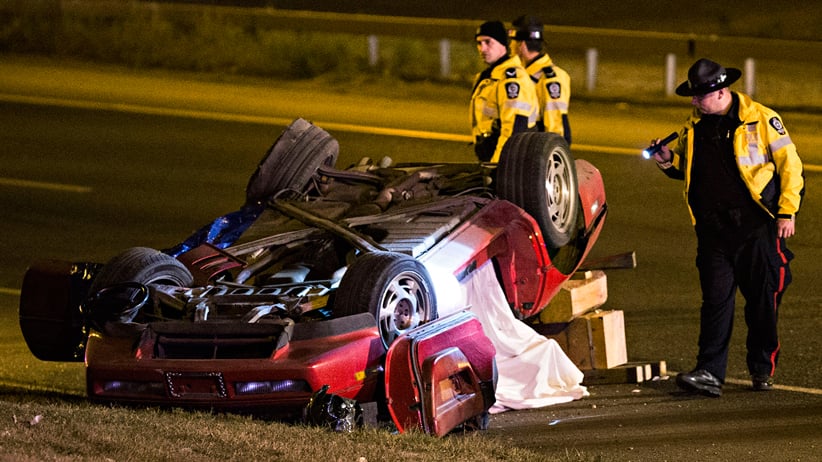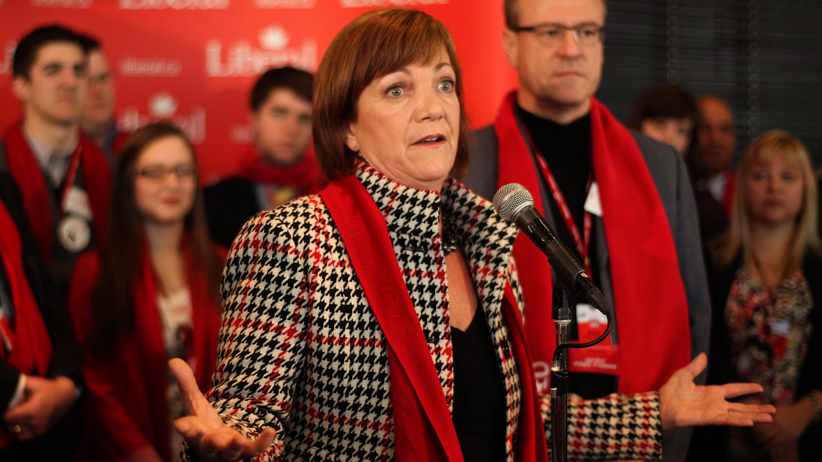Is this a watershed in battle against sexual harassment?
How the fight against drunk driving could offer us lessons and omens that stigma will come to sexual harassers
Police investigate the scene of a single vehicle fatal crash that occurred on Yellowhead Trail westbound near the Victoria Trail overpass in Edmonton, Alta., on Sunday, Oct. 12, 2014. Allan Dean Balay has been charged with impaired driving causing death, dangerous driving causing death. Police says more charges could be pending. Codie McLachlan/Edmonton Sun/QMI Agency
Share

What seems like a turning point can, with the passage of time, prove a lot less pivotal than initially thought. In the early 1980s, a series of high-profile car crashes moved Ottawa, the provinces and police to crack down on drinking and driving, confirming what many Canadians had treated as a venial sin—committed in some cases with a wink and nudge—as a serious criminal offence. Road safety advocates thought at the time they’d reversed public attitudes. They spoke optimistically of “stamping out” drunk driving.
But the highway carnage kept coming, and three decades on, Andrew Murie, the chief executive of Mothers Against Drunk Drivers Canada (MADD), refers to those terrible crashes as “creepers”—national traumas that for a brief time rattled a complacent public, clearing the way for new laws and longer sentences. “It can be hard,” he says. “You wonder whether you have to wait for the next tragedy to take the next baby step.” But for thinking people, Murie notes, the message sank in: Since the early ’80s, the percentage of traffic fatalities that are alcohol-related has been nearly cut in half, and now stands at about 30 per cent.
That experience stands as a beacon in the battle against a different, no less pervasive, social ill: sexual harassment. Activists hoping to stop the scourge have for years wished that harassers faced the level of stigma impaired drivers do—the kind that makes you examine your conscience. But high-profile harassment cases have been few and far between, while others have played out away from the public eye, for reasons of personal privacy.
Now, with sexual misconduct allegations swirling around former CBC host Jian Ghomeshi and two Liberal MPs, the issue is taking an unaccustomed place in the spotlight. The recent headlines have triggered an outpouring of testimony from victims who say they have endured sexual harassment while working near the heart of the country’s media and political power structures. Last week, one woman detailed to the National Post a torturous stint as an intern on Parliament Hill, where she endured an onslaught of physical advances and verbal harassment by an aide to a Liberal MP. The following day, Ian Capstick, a political commentator and strategist, disclosed on national TV that he’d endured similar treatment years ago from two male MPs while he was working as political staffer for the NDP.

Finally, on Monday, former deputy prime minister Sheila Copps stunned political observers with a column in the Hill Times saying she’d been sexually assaulted by a male colleague during her time as an Ontario MPP. Copps—a staunch feminist who’d made more than few male colleagues quail with her rhetorical bluster—had been one of the first to defend Ghomeshi. But she recanted, and went on to describe being pushed against a wall by a male MPP after a day-long parliamentary session on, of all things, violence against women. “I pushed back on my assailant, kicking him where it hurts,” she wrote, adding: “I never reported him, chalking the incident up to personal misjudgment.”
Her reluctance to complain typifies that made by the estimated 92 per cent of Canadian harassment victims who opt against reporting (the latest numbers are from a 2004 Statistics Canada study, a fact advocates say underscores inattention to the issue). But Copps’s decision to speak out has raised hopes among women like Dianna Evangeline, who 25 years ago won a landmark Supreme Court of Canada decision defining sexual harassment as a form of discrimination prohibited under the Charter of Rights and Freedoms.
“I think this is a watershed,” says Evangeline, who as a 21-year-old woman was verbally and physically hounded by a cook while working as a waitress in Winnipeg. “For victims to be this vocal, for the news to be covering these cases, is so important. We’re talking about MPs who are equal—eye to eye with each other in our nation’s legislatures. Yet somehow [harassment] goes on even there. Somebody has stood up and said, ‘unacceptable.’ And that makes me happy.”
Related:
Editorial: A national conversation about sexual assault has begun. Finally.
Is it any wonder women don’t report?
#YouCantShutMeUp: Feminism goes viral
Evangeline, now a senior health care administrator, is first to lament that change hasn’t come more quickly. The decision she won in 1989 landed fully nine years after the U.S. equal employment-opportunity commission adopted regulations to the same effect. Over the next two decades, she listened despondently to the stories of women who endured in silence the precise behaviour that drove her to the human rights process. Universities, corporations, the military and the RCMP have all faced sexual harassment scandals since. “I’m disappointed that things didn’t move faster,” Evangeline says, “but I’m part of a generation of women who were the first to speak up. We’re moving that boulder up the mountain.”
It might move faster now that the issue has uptake among those who can trigger social change, from political leaders to media commentators. In The Tipping Point, his 2000 book on how ideas, movements and behaviours spread, author Malcolm Gladwell referred to these influential actors as “connectors” and “mavens” and “salesmen.” They’re precisely the sort of people who helped turn the tide against drinking and driving, says MADD’s Murie, whether through personal example, by voicing disapproval among their friends or by using their profile to push the issue on to the public agenda. (He points to Ontario’s zero-tolerance law for drinking by drivers under 21: The idea gained traction, Murie says, only when political leaders, businesspeople and media commentators got behind Tim Mulcahy, a marketing entrepreneur who lobbied for the law after his 20-year-old son and two other young people were killed in a 2008 crash.)
Still, as an issue, the battle against sexual harassment faces considerable challenges. One is our collective reluctance to publicly air out personal matters. Another is the lingering perception that the harm inflicted by harassment simply doesn’t compare to that of offences like, say, drunk driving. Wendy Komiotis, executive director of METRAC, a Toronto-based organization dedicated to ending violence against women, has spent a great deal of time trying to dispel that idea. Even suggestive comments and unwanted touching can make one’s workplace, school or social circle a dreadful place, she says, while in extreme cases, “women can be in terror for years. It’s basically post-traumatic stress.”
Yet the attitude of dismissiveness, say legal advocates, is reflected in the modest awards granted to harassed women through the human rights process. While Ontario lifted the cap on awards a few years ago, findings of verbal harassment routinely net an award of just $1,000, says Nicole Simes, a Toronto lawyer who specializes in employment and human rights cases, while awards stemming from some form of assault rarely rise above $25,000. “There’s not enough incentive there for companies and institutions to put their resources toward better non-discrimination training and investigation of complaints,” she says. “There’s a gap between the law we have and how it’s being applied.”
That squares with Evangeline’s experience. She endured verbal abuse, sexual touching and sexual advances from her coworker in 1982 before finally taking her complaint to her boss. His response, according to Evangeline: “You need a f–k, anyway.” For that, and after seven years winding her way through human rights tribunals and the courts, she won a $4,000 award, which she never bothered to collect from her former employer. The establishment, Pharos Restaurant, closed years ago, but Evangeline still shudders as she passes the building.
Still, she’s glad she spoke up. Each year, Evangeline speaks at conferences held by the Women’s Legal Education and Action Fund, who funded her legal battle, assuring harassed women that it is worth it to come forward. In the past two weeks, as prominent voices have echoed her decades-long call to action, her faith in her convictions has swelled. “We’ve seen some change in my time,” she says, “but I’m hoping there’ll be a lot more before I leave this world. We’ve only just begun.”